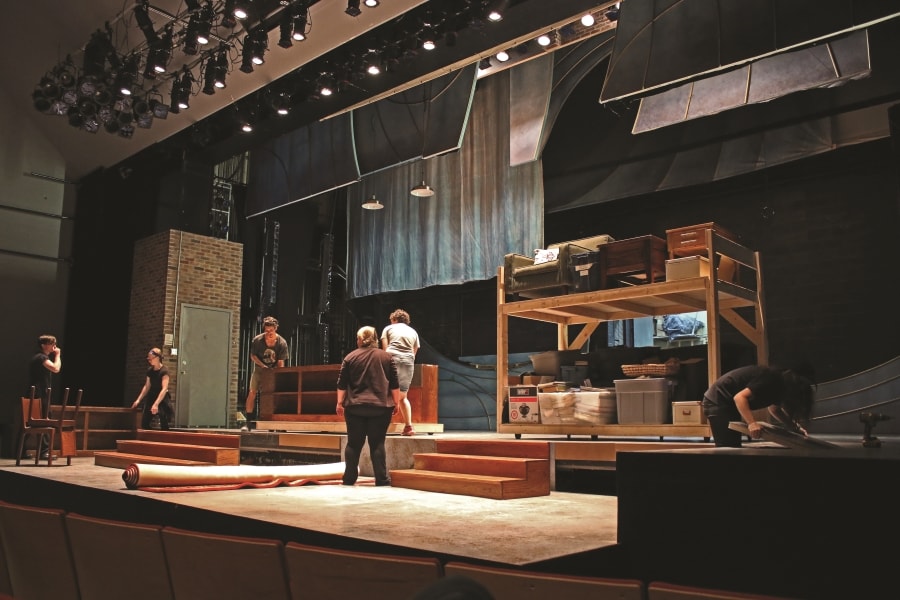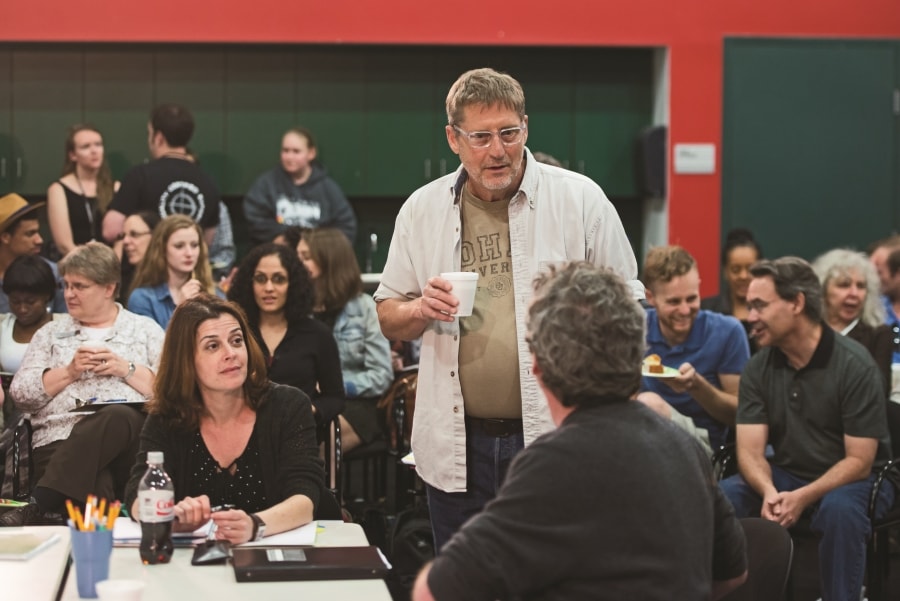In 1991, Ed Herendeen found his way to Shepherdstown, W.Va., after a three-year stint as an adminstrator at the Williamstown Theatre Festival. In partnership with Shepherd University, he set out to bring some of the Berkshires’ summer theatre magic to the Blue Ridge Mountains.
Under Herendeen’s leadership, the Contemporary American Theater Festival has produced 133 new plays, 56 world premieres, and 11 commissions in its 31-year history. I first traveled to CATF in the summer of 2015, and I was lucky to return the following three summers in my capacity as a writer and editor for American Theatre, each time bringing friends and family to experience America’s newest plays in West Virginia’s oldest town.
As a reporter, I had an inside peek at the process of mounting six productions in rotating repertory and got to know Ed and the CATF staffers through many interviews over the years. The news that Ed is leaving the helm of the festival struck me as significant—the festival I’ve come to know and love won’t be the same next summer without Ed greeting patrons before and after shows on Shepherd University’s campus. (His longtime associate, Peggy McKowen, will serve as interim producing director while the board searches for Herendeen’s replacement.)
At a time when season planning would usually be ramping up, I was thrilled to catch up with the festival’s leader as he instead prepares to step aside.
ALLISON CONSIDINE: This is big news! How are you feeling?
ED HERENDEEN: I hope you hear it in my voice: I’m feeling very happy. If there’s been a silver lining to this crazy, horrible, tragic pandemic, it was that for a lot of us, it was time to stop and slow down. This gave me a lot of time to really reflect and think—I’ll give you a little backstory so you know that this didn’t come out of left field. In 2019, well before the pandemic and George Floyd and Black Lives Matter, I had selected the season for 2020, our 30th anniversary. As I announced that season, I also announced to the board that we should form a transition committee because I would be retiring somewhere between the 30th anniversary and the 35th. I wanted the board to take the time to really begin the transition process whenever it did happen, so in that sense, it wasn’t abrupt or a surprise. What changed everything was the pandemic, and then, of course, everything that’s happened to our field since then.
The six plays selected for the 2020 season will finally hit the stage in the summer of 2022. How has this postponement affected the production process?
The most important job I do is select the season. In some cases, that’s the hardest part, but for me, it’s where the joy is. So the six plays are already picked. All the designers have been working for two years virtually on these plays. We have never drilled in on six plays more. We were able to really take time to do deep text analysis with the writers and changes are coming to some of these scripts, because the world is changing since we announced them in 2020.
They are inclusive, diverse, signature CATF plays, as they all are in our body of our work…That body of work tells you everything you need to know about me and about time from 1991. If you want a snapshot of what was going on in a certain year, look at the six plays we were doing. I would like to think that we were relevant and current. The work speaks for itself, but I’m very grateful to have had the opportunity to play in the sandbox that we created together.
Part of the CATF magic is how involved the community is in the process of the festival, with behind-the-scenes tours and town halls discussing the plays. How has the festival continued to connect with the Shepherdstown community while shows are on pause?
Last year we did the “Unmuted Series,” which was 10 minutes of a scene from a play on Zoom, and lots of interviews and in-depth conversation. So, very CATF in that the literature really what drove the series. This year it was the “Words Matter,” an audio series with the plays The House of the Negro Insane and Sheepdog. Peggy McKowen was instrumental in what we called “street parties,” so there were four weekends that would normally be the festival weekends. They were meant to be downtown in the street where we had music—but our downtown library got hit with a car so the building was damaged. We had about 36 hours to figure out how we’re going to move everything up to the Marinoff Theater. It was just so wonderful, because we still got to come together and we still got to experience the stories, and it was really cool. Everybody had their own set of headphones, kind of like a silent disco. It was so cool to see 100 people listening to a story at tables eating sushi, all absolutely silent, listening to a play.
What really stuck out to me is that we could all come together in this socially distanced fashion. There were still conversations happening after the show, people were hanging around and discussing, which is something you can’t necessarily do if you’re listening to a play or watching a play online. The most important thing is, it kept us alive in the local community, and to some of our patrons we could say, “We’re here, we’re planning on coming back, we haven’t gone anywhere.”
You have built an audience hungry for edgy, challenging new plays in the small town of Shepherdstown. What are your hopes for the repertoire moving forward?
Oh, I’m so curious. I have no expectations other than my curiosity to see what Peggy is going to do as the interim producing director, and as the board comes together and works with the staff on the new leadership model. I did it my way in a sense, along with all the people that work with me, but there is a tremendous opportunity now because there was a solid, stable foundation and a sincere commitment to mission and core values. It is a wide open question now and a clean palate. I, like the audience, am very curious as to what it will be, but I know a passion for new work will be at the center of it.

In season 2016, I remember watching the stage turnover from pen/man/ship to The Second Girl, and it was just wild how quickly water onstage was cleared and a working faucet was installed. In the past three decades, what have been the biggest challenges of putting together a repertory season?
Repertory was extremely critical to how this would be a festival. We have been casting a repertory where actors can be in more than one play. We have been working with designers who design two sets in the same space, and we have made the challenge of doing repertory actually a passion. It was the only way we thought of doing theatre if you’re going to see six plays in a two day or three-day period. It was a lot of fun. It was intense at times.
So there was that technical element, that the tech staff had to do a changeover in about an hour and a half to be ready for the next production that day. But sometimes it was more the emotional ride for an actor to do a one-person show like My Name Is Rachel Corrie and then go into a Lee Blessing’s Lonesome Hollow the same day. That’s the resilience and the power of storytelling, and the resilience and the power of an extraordinary human being, an actor. William Ball called actors “gladiators.” We saw that time and time again here, when an actor could go from doing a solo performance or doing a major emotional role, and then doing an equally emotional role or doing something totally different, from realism to surrealism and realism to fantasy all within the same day. And they tell me—the gladiators—that they loved it.
What have the past two summers been like without the busy-ness of producing six plays in rotating repertory?
You know me and my energy level, so two years of no theatre—it’s been interesting sitting in my garden. I got to see the summer for the first time from a different point of view than I ever have after 30 years of doing summer theatre. In all seriousness, it gave me precious time to listen to my voice and to listen to my family. My vocation is not changing, but maybe the delivery of my vocation will change—I haven’t thought that far ahead. But my voice and my vocation for the last 31 years has been creating this festival, and more importantly, has been producing new American theatre and working with playwrights and artists. It is not a one-person operation, and it should never be looked at as the founder stepping down. No, I am turning over the leadership to the next team that will continue what we have all done together.
Theatre is a collaboration. Producing six plays in a rotating repertory is an intense collaboration, and that collaboration will continue. I’ve had the honor and the opportunity to have an idea, and then see that idea be given birth by incredible artists, board members, funders, and trustees—so it’s just been a wild and a great ride. I gave it my all and have enjoyed every minute of it. How can I beat making believe for a living and doing new work for 31 years?
So your vocation is not changing. But is your location?
When I first came here, my wife and I were sitting on a bench in front of the Frank Center. Then there was only a field there, an empty meadow all the way down the hill and into the other end of campus where the Blue Ridge Mountains were off in the distance. And we stared at the Blue Ridge. We had this crazy job offer. That was scary—it was like, do I do this? Do I know anything about how to do this? One thing we did know was that we loved the geography, the little bit of time we had to explore the historic village and the historic town on the Potomac River and the Blue Ridge. And looking out over that view—I know this sounds like bullshit, but my wife said to me, “Wouldn’t it be great to grow old in this town?” And that kind of cemented it for me. My intuition somehow clicked in. I knew something was going to happen here. I knew something, maybe I couldn’t articulate it, but I knew it was gonna be big in our life. That was a big choice to make, and it’s turned into a really happy choice.
Allison Considine (she/her) is a former senior editor at this magazine, and now works as a digital editor at Master Class.


